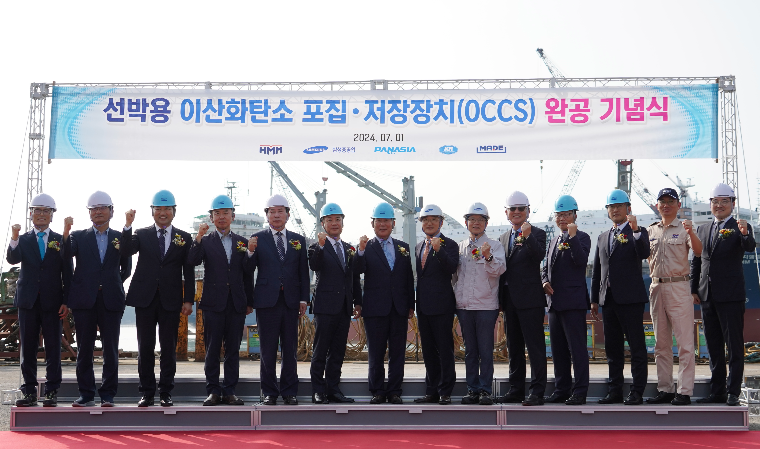SHI Installs the World’s Largest Onboard Carbon Capture and Storage (OCCS) System and Starts Demonstration
2024-07-02

- Samsung Heavy Industries (SHI), HMM, PANASIA, and Korean Register conducted a joint research and development of an Onboard Carbon Capture and Storage (OCCS) system that can capture 24 tons of CO2 each day.
- SHI plans to accelerate the installation of the system to eco-friendly vessels such as an liquefied CO2 (LCO2) carrier.
On the 2nd, Samsung Heavy Industries (SHI) announced the initiation of a launching ceremony of an Onboard Carbon Capture and Storage (OCCS) system, a new system jointly developed by SHI, HMM, PANASIA, and Korean Register, and a plan to start the demonstration of the new system.
Executives of each company such as Soo-tae Lee, CEO of PANASIA, and Jin-mo Kim, Vice President of SHI, and Mokpo Mayor Hong-ryul Park attended the event held on the 1st at the Hankookmade Shipyard in Mokpo.
The OCCS that can capture, liquefy, store, and reuse CO2 generated during a ship’s operation is rising as a core technology that can achieve net zero in the shipbuilding and shipping industry.
The new system which was developed with purely domestic technology boasts the largest scale in the world as it can capture, liquefy, and store about a ton of CO2 per hour and 24 tons per day on vessels.
In April 2023, the research group of four companies including SHI signed an ‘onboard carbon capture system test agreement’ and conducted studies including the detailed design and feasibility test.
SHI and PANASIA took charge of the OCCS demonstration after HMM successfully installed the system to the 2100TEU container ship during operation, while HMM takes charge of facility operation and stability evaluation.
Through the demonstration, it is expected that four companies will △verify the new system’s CO2 capturing·liquefaction ability, △secure onboard operation data, and △accumulate OCCS operation experience.
SHI plans to actively utilize OCCS when developing an LCO2 carrier as well as for SHI’s other large-sized vessels.
“Development of the OCCS possesses a significant meaning as it was jointly developed by professional shipbuilding companies as a core technology that supports achieving net zero by 2050,” said Jin-mo Kim, the head of SHI’s Future Business Development (Vice President). “Through continuous research and development, SHI will keep on securing technological competitiveness that can put Samsung Heavy in the leading position of the eco-friendly vessel market.”
